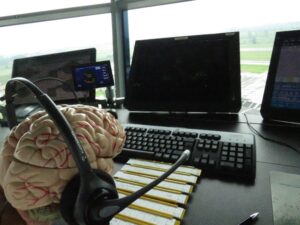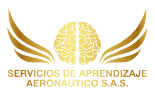“The Culture of Self-Knowledge”
The hardest part has been to make people understand that they themselves have created unwanted situations, from which over 80% have not even survived to tell.
Over 80% of plane crashes are due to human errors, I believe it is 100%, the reason? you can find it along with this reading.
In all aeronautical activity where humans intervene, they must go through an instruction, coaching and/or training process, in absolutely every activity.
Right here is where everything begins:
“The teaching-learning processes”

In light of the overview of the human factor stated in the previous paragraph, it is worth highlighting that we talk about how important and relevant the processes of instruction, coaching and/or training in the aviation field are; good practices in these activities result in good work environment and, of course, human behavior. So deep can this topic become, that even from the experiences lived in aviation education, the sense of belonging, the vocation of service, the same responsibility and awareness of the entire aeronautical spectrum, emerge.
These sensitive issues are, sadly, approached shallowly. Aviation technicality has made us leave this part of the human factor in the background.
The human factor in aviation has been studied from different perspectives and disciplines. The decision to use one or another model depends on the philosophy and policies of a company or the provisions of national or international institutions in charge of air safety. (Sánchez, 2010)
Since the human factor is an issue addressed in all national and international companies and/or institutions as a fundamental part of aviation safety, why do plane crashes continue to occur? I know, you are probably answering “because human errors cannot be vanished”. Albeit true, disciplines that help reduce human error have not yet been contemplated; something as distant from us as our brain, the human brain, has not yet been contemplated. From there, something I have called the "Neuroeducation in aviation" to reach the culture of self-knowledge.
The contributions generated by scientific research have greatly reduced the novelties and problems of sudden incapacitation in flight due to medical aspects (DeJohn, Wolbrink and Larcher, 2006), but there are many other aspects related to the concept of health that corresponds to the work of aerospace medicine, aviation psychology, and related disciplines. For example, it is important to venture into other areas such as education and training, accident investigation, and scientific research. These professionals must open up to other proposals that complement and optimize their aviation performance, to serve as mediators between the different levels of the aeronautical system for better work on the issue of the human factor. (Sánchez, 2010).
Nowadays, aerospace medicine studies the diseases and disorders of the human organism associated with exposure to hostile environments, and aeronautical psychology also seeks to prevent air accidents and incidents, contributing to the effect of human error to be as small as possible. Now, neuroeducation has come to strengthen what in aviation is essentially the basis for all human development in the aeronautical environment: the teaching-learning processes.
“Knowing yourself is the beginning of all wisdom”. Aristotle
I am convinced that through this discipline (Neuroeducation in aviation) it is possible to reach the “Culture of self-knowledge” which is essential for growth and development in aviation. For years we have seen how human beings have generated different types of technologies for the benefit of aviation in general, likewise, human beings should ensure knowing themselves to enhance that growth and development, to know how to face the limitations, and above all, to know the emotions we have been slaves and even victims to.
What is neuroeducation in aviation?

As a contribution to Aviation Safety, I found in the integration of Psychology, Pedagogy, Neurosciences and my experience as a teacher, psychologist, flight crew, military and civil air traffic controller, the importance of the conceptual incorporation of the Neuroeducation in the processes of teaching and learning in aviation.
Neuroeducation is the ideal supplement in all the processes of instruction, training, and evaluation of people who work in all aviation environments.
Basically, this is because in aviation the learning is continuous and the updates that must be made to all personnel are very recurring. Aviation grows and develops rapidly and the preparation of its personnel must keep up with it; men and women also work in aviation at different stages of maturity, which makes how knowledge should be transmitted special. (Bernal, 2019)
Neuroeducation in aviation is a concept integrated into the existing needs in the teaching-learning processes in the aeronautical community.
Even though it is true, globalization involves aeronautical and all kinds of technological changes. Cognitive processes also demand changes, and under this concept, neuroeducation seeks to bring teachers, instructors, tutors or students closer to basic knowledge about the structure, brain architecture and its functioning as the biological conception of learning from the perspective of neuroscience and about the neural mechanisms of information processing that lead to memorization and the learning process.
The perception of each of these aviation actors is different, hence the need to apply concepts that allow teachers, instructors, and apprentices to recognize the different ways in which the brain interprets and understands aeronautical knowledge and experiences. It is about stimuli and emotions turned into memories, into constructive and positive learning that you never forget.
Knowing how the brain is, how it works and how it develops, even in general, is essential for those who are interested in applying its marvelous properties in the workplace training of those who work in aviation. (Caicedo, 2017)
Learning is the process by which human beings modify their behavior to adapt to the conditions of their surrounding environment.
For this ever-changing aeronautical environment, changes in the behavior of those who intervene in each of their areas, are achieved through learning. Eventually, that is the main mode of adaptation of living beings.
Therefore, learning can be considered as a change in the nervous system that results from experience and causes long-lasting changes in the behavior of organisms.
Because the brain is the control cabin of the central nervous system, it is there that the experiences-resulting stimuli can generate changes that, according to the nature and intensity of these stimuli, will depend on how lasting the changes in behavior will be.
One can say, in educational terms, that with the intensity that positively motivates the student, they surely will not forget what they learned.
The brain is unique to each human being, and this makes us individually different. Understanding it will make us more tolerant and will help every teaching-learning process.
“Aviation needs to be aware that the diversity of human behavior lies in its neural processes, and its understanding will help optimize the human resource”- David Bernal R.
¿Why is an education based on the functioning of the human brain necessary?
Whoever reads this initial question should be asking themselves why psychologists, parents, teachers, and even students themselves should know how the human brain works. The idea that prevailed for several centuries, which is incorrect, of course, is that knowledge of the brain is a task only for psychologists and neurologists. According to De Zubiria (2009) "just as Benjamin Bloom's studies re-evolved didactics, knowing the mind will re-evolve pedagogy" (p.26, t.4). And didactics, as well. (Ortiz, 2015).
Aviation must also re-evolve, we must all be aware of the importance of self-knowledge. It could be that an air traffic controller, flight crew or dispatcher instructor gets little to no benefits from knowing how the mind works. It is not like that. Such knowledge will show you the areas of the brain involved in each decision-making action. You will know that external and internal stimuli generate emotions, and these are decisive in decision-making, but above all, it will give you clues about what you should teach, and at what time. You will comprehend that adult education is different, and that self-knowledge makes us more tolerant and better people. Neuroeducation is part of the re-evolution in aviation.
Bibliography:
Bernal,D (2019). Neuroeducación en Aviación, Instrucción en el puesto de trabajo otra perspectiva del OJT, un aporte a la seguridad operacional. Aviación Digital Recuperado de: https://aviaciondigital.com/neuroeducacion-en-aviacion/
Caicedo,H (2017). Neuroaprendizaje, una propuesta educativa. 2da. Edición. Bogotá: Ediciones de la U
Ortiz,A (20015) Neuroeducación ¿Cómo aprende el cerebro humano y como deberían enseñar los docentes? Bogotá: Ediciones de la U
Sánchez, L (2010). El estudio del factor humano en accidentes de aviación. Pensamiento Psicológico, vol. 7, núm. 14. Pontificia Universidad Javeriana. Cali, Colombia. Recuperado de: https://www.redalyc.org/pdf/801/80113673011.pdf
By David Bernal Rodriguez
Psychologist
Master in Neurosciences and Multiple Intelligences
Air traffic controller, Aerocivil Bogotá-Colombia
Artículo publicado en: https://www.unitingaviation.com/mags/2019-Training_Vol9-N1/index.html#page=32
